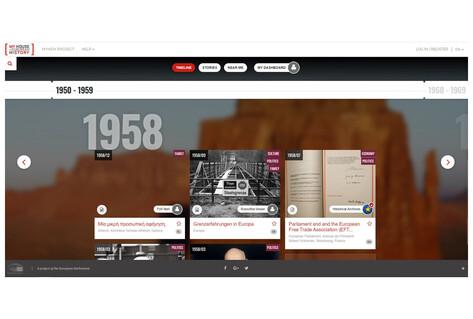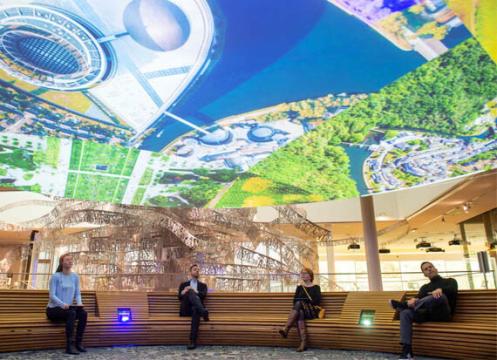
Headlines of our time
Join us on a multilingual tour through the new 6th floor space of our permanent exhibition - entitled ‘Europe Now’. Explore the many challenges facing Europe today – climate change, its colonial heritage, Brexit and the Covid pandemic, to name but a few.
This video was created on 9 May 2021 - Europe Day - for the opening of Europe Now on the 6th floor of the House of European History.
Nobel Peace Prize
In 2012, the European Union was awarded the Nobel Peace Prize. The Nobel Committee recognised the EU’s achievements in promoting reconciliation and peace, democracy, human rights and social welfare.
In recent years, however, the European Union has been going through a series of crises, which have put it under considerable pressure.
Economic and monetary issues, the migration crisis, terrorism, Brexit and other dramatic events of our time demonstrate just how fragile and conflicting the current realities are.
Nobel Peace Prize medal
Oslo, Norway, 2012
Replica
House of European History, Brussels, Belgium
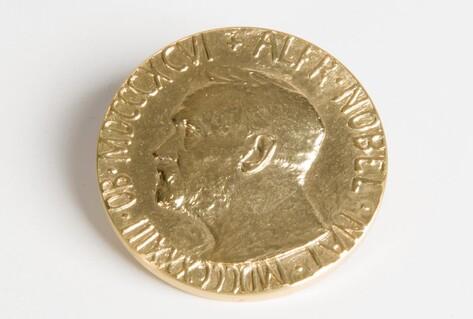
Climate change
Climate change is one of the greatest challenges of our time; a threat to the very future of our life on planet Earth. Human-made global warming, caused by excessive CO2 emissions and industrial pollution, is destroying whole ecosystems and making our way of life unsustainable.
‘Fridays for Future’, an initiative launched by young Swedish activist Greta Thunberg, has become active around the world, with students demanding a radical ecological change of course.
For today’s 15-year-olds, climate change is a tangible threat to their future prospects.
Banner used on manifestations by Youth for Climate
Brussels, Belgium, 2019
House of European History, Brussels, Belgium
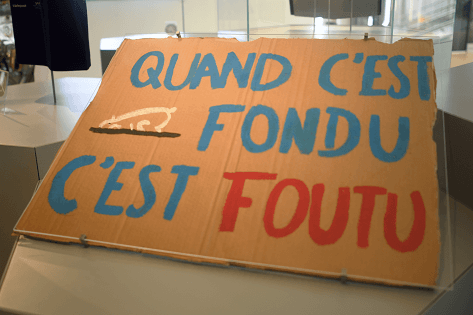
Brexit
For the first time ever in history, a Member State decided to leave the EU.
Following the result of a divisive referendum, the United Kingdom triggered Article 50 of the Lisbon Treaty, setting in motion its exit from the EU on 31 January 2020 after 47 years of membership.
This historical moment was epitomised when the UK flag was taken down from outside the Committee of the Regions in Brussels and added to the House of European History’s collection
The Union Jack taken down from the Jacques Delors building, Committee of the Regions
Brussels, Belgium 2019-2020
House of European History, Brussels, Belgium
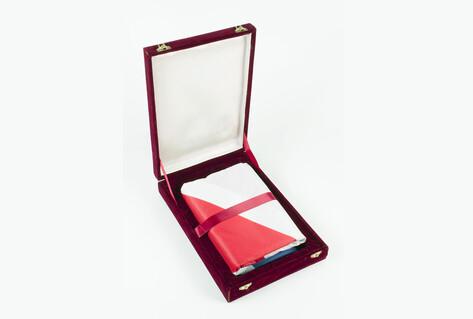
Colonial heritage
For centuries, Europe’s colonial rule over vast territories and regions around the world brought wealth and resources to Europe while leaving local populations oppressed and impoverished.
Niyi Olagunju’s sculpture expresses the brokenness of identity resulting from the traumatising experience of colonialism. Objects that carry spiritual, religious, social or societal meaning ended up as exhibits in European museums. This appropriation and assimilation of African history, culture and traditions violates the objects’ original meaning and results in historical rootlessness.
Some European countries have begun investigating their museum collections amid calls for objects with a questionable history to be returned.
"Baga Nimba” - Niyi Olagunju (born 1981)
United Kingdom-Nigeria, 2019
Sculpture
Artificially aged wood and gilded bronze
House of European History, Brussels, Belgium
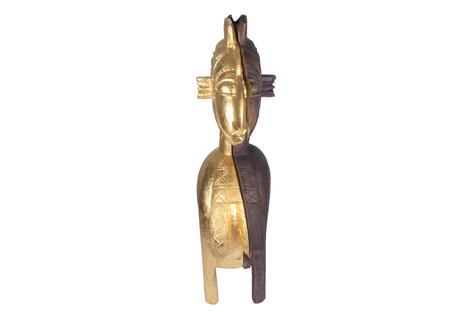
Headlines of our time II
Wars
War and military conflicts persist in Europe, even though the EU’s member countries have succeeded in avoiding war with each other. The Russo-Georgian war in 2008, the Russian annexation of Crimea in 2014, the frozen conflict in Donetsk and Luhansk, and the Armenia-Azerbaijan border crisis, which erupted into a short war in 2022, are all stark reminders that peace cannot be taken for granted.
In February 2022, Russia launched an illegal military invasion into Ukraine. The war keeps escalating, shaking the Western concept of security, with the Russian side threatening to use tactical nuclear weapons. Some experts are warning that we have never been so close to a third world war.
Door of a passenger car shelled by the Russian army
Irpin, Kyiv Region, Ukraine, 2022
House of European History, Brussels, Belgium
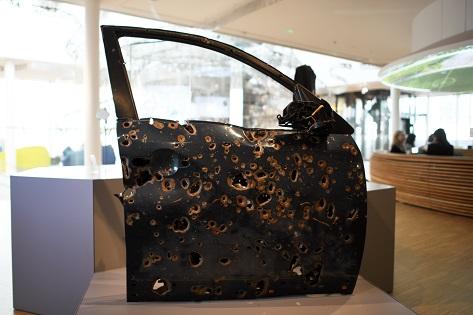
Solidarity with refugees
Since February 2022 the Ukrainian army is defending the country against an illegal Russian invasion, with military support from NATO and the European Union. The war causes unimaginable suffering and destruction and leaves tens of thousands of soldiers, but also civilians, dead or wounded.
Millions of people, mostly women and children, fled Ukraine and found shelter in the countries of the European Union. The Russian aggression against Ukraine forged a strong bond between EU-member states and triggered a wave of solidarity across the continent. Civic society and non-governmental organisations were helping the refugees to recover from the horrors of the war.
T-shirt saying ‘I am here to help you’ worn by volunteers welcoming Ukrainian refugees at the Romanian border
Dan Perjovschi (born 1961)
Seneca (SNK) association, Bucharest, Romania, 2022
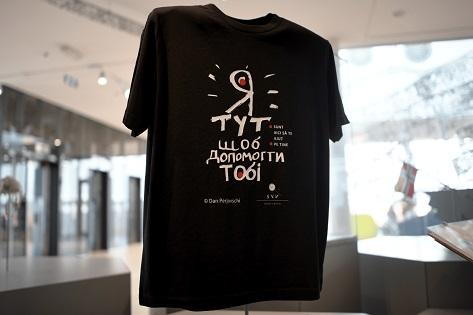
Pandemic
The COVID-19 pandemic has exposed humanity’s vulnerability and has put European solidarity to the test.
At the beginning of the pandemic, European countries responded individually by closing borders, limiting freedom of travel, and curtailing civil liberties. Critics fear that fundamental freedoms might be restricted in the long term.
But amid all that adversity, a wave of solidarity emerged among ordinary people. Meanwhile, the Member States and the EU institutions came together and agreed on an unprecedented recovery programme designed to support the societies and economies worst affected by the pandemic.
“Hand Mask” by Anna Vasof (born 1985)
Ceramic and elastic bands, Vienna, Austria, March 2020
House of European History, Brussels, Belgium
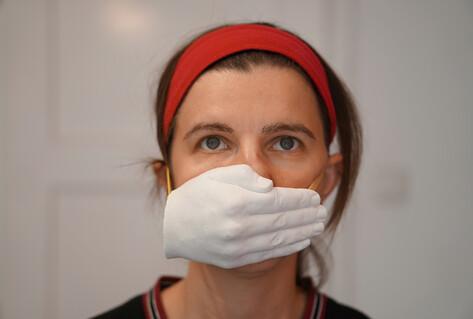
Digital revolution
New technologies are radically changing the way we live, communicate and interact with each other. The world is becoming more interconnected, offering many opportunities but also creating new risks.
Data is now considered the ‘new oil’ and with that, digital privacy has become one of the biggest challenges of our time. Collecting information about our behaviour, thoughts, and desires allows companies to influence and manipulate our lives and the choices we make. New communication tools have now paved the way for far-reaching surveillance and the rapid spread of disinformation.
Without us even noticing, the democratic process of entire societies may be undermined and citizens could lose their freedom of choice.
‘Pixelhead’ used as anti-surveillance mask
Martin Backes (born 1977), Germany, 2010
House of European History, Brussels, Belgium
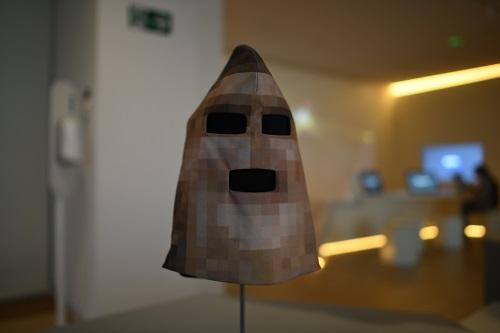
Terrorism
Terrorism poses a threat to Europe’s security and democratic order and is now part of a global phenomenon in today’s society. Islamist or far-right wing terrorist attacks across Europe are a violent expression of ideas that stand in sharp contrast to the values of diversity and pluralism.
Extreme ideologies often find their inspiration in ideologies that look to the past or in religious fundamentalism.
In the face of such hatred and violence, the people have been quick to respond with solidarity and calls for mutual acceptance and peace.
Message of solidarity after far-right wing terrorist attacks
Oslo and Utoya, Norway, July 2011
© Riksarkivet, Oslo, Norway
Cardboard sign with a solidarity message left after the terrorist attacks in Madrid, 2004
Museo del Ferrocarril de Madrid
Tracking my Europe
Tracking my Europe
What brings people in Europe together? The nature of Europe´s diversity largely results from cross-border encounters and cultural exchanges.
Map your connections to places in Europe and beyond as part of this collaborative mapping experiment.
Tracking my Europe © House of European History, Brussels, Belgium
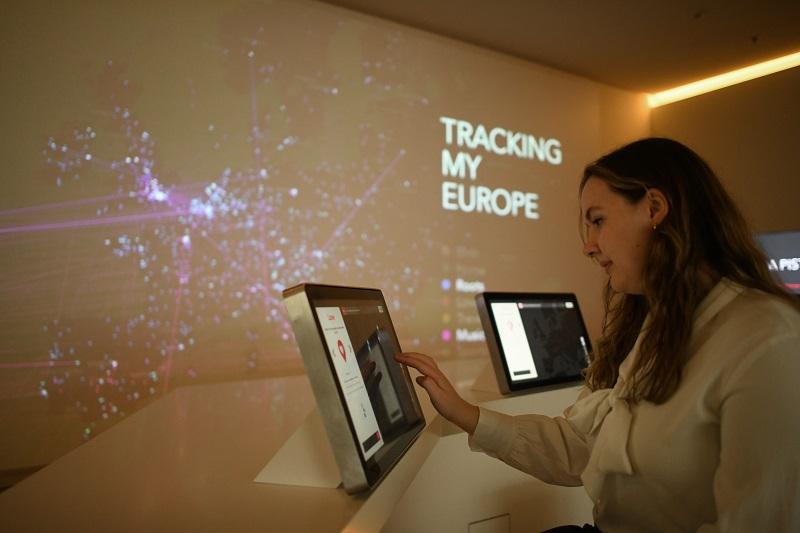
Vortex of history
Audio Guide
Vortex of history
This swirling sculpture that dominates the museum’s central stairwell consists of 27 historical quotations representing the ever-changing interpretation of European history.
Eastman Construction site - Renovation of the building for the House of European History
© European Union - House of European History 2016 / Benoit Bourgeois
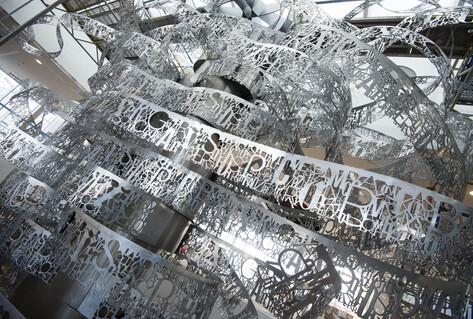
Vortex of history
In our exhibition you can add your thoughts to the rest of the artwork digitally.
Vortex of history © House of European History, Brussels, Belgium

Europe from the skies
European landscapes
Viewed from above, Europe’s terrain reveals traces of history from a new perspective. Its landscapes are largely cultural ones bearing the marks of human activity for better or for worse. History has led to remarkable variety, showing astonishing similarities and differences.
European landscapes © House of European History, Brussels, Belgium
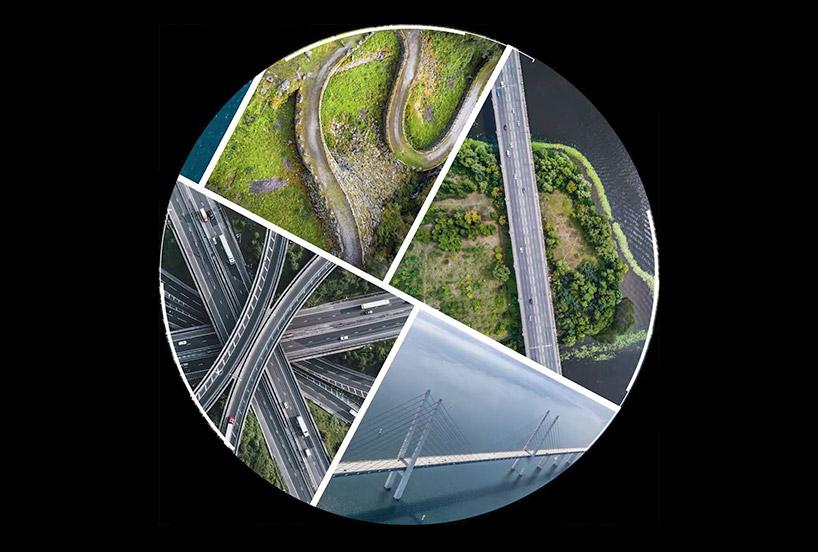
Views on Europe
Views on Europe
Explore European cities past and present through webcams and works of art. Create your own immersive virtual tour and have it projected onto the walls using any of the three devices.
Views on Europe © House of European History, Brussels, Belgium
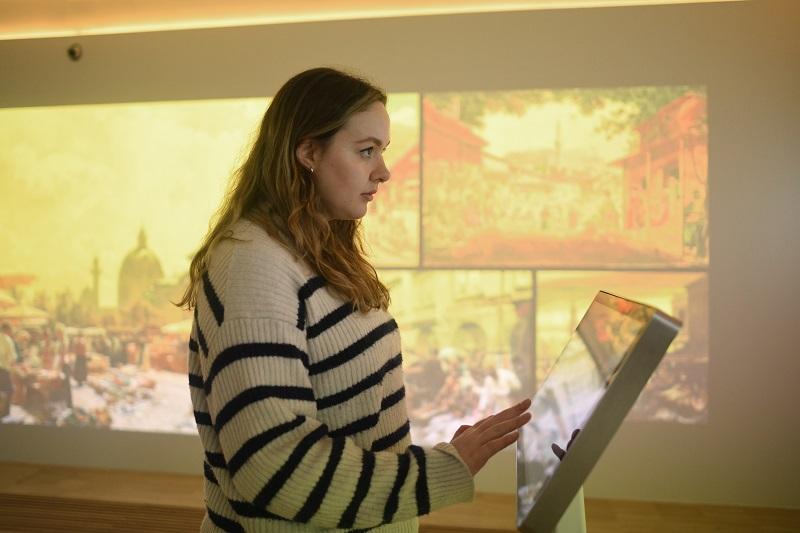
My House of European History
My House of European History is a unique collaborative project incorporating personal testimonies on Europe. The stories are arranged in time segments and each story has its own geographical location. You can use the interactive map to discover these. You can also register to add and share your own European memory
My House of European History © House of European History, Brussels, Belgium
